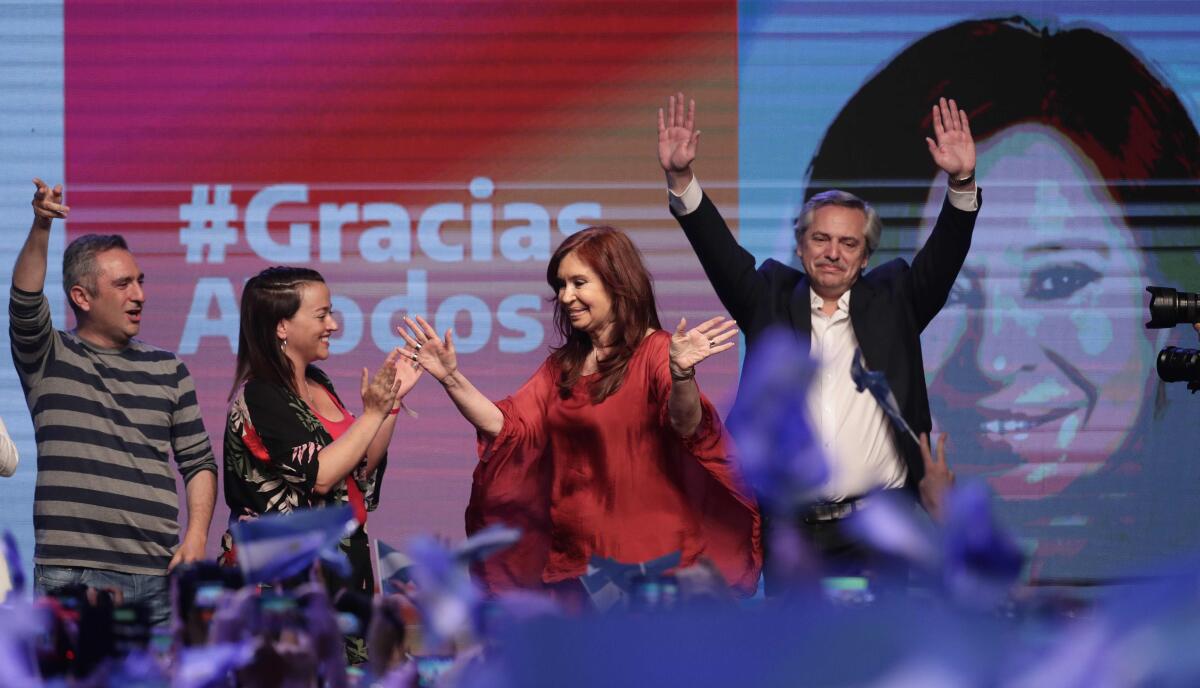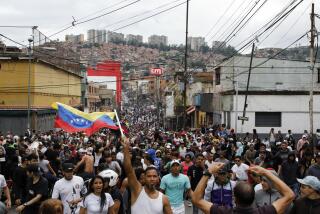Dramatic election returns Argentina’s center-left Peronists to power, puts markets on edge

- Share via
BUENOS AIRES — Argentina’s Peronists celebrated their return to power after incumbent President Mauricio Macri conceded defeat in a dramatic election that probably swung the country back to the center left, saw the return of a divisive former president and threatened to rattle financial markets.
As investors nervously eyed Monday’s market opening, thousands of jubilant supporters of Alberto Fernandez and his vice presidential running mate, former President Cristina Fernandez, waved sky-blue and white Argentine flags and chanted, “We’re coming back! We’re coming back!”
“Today, Alberto is the president of all Argentines,” Cristina Fernandez told supporters, some of whom brandished tattoos with her image and the image of her late husband and predecessor as president, Nestor Kirchner.
Late Sunday, authorities said Alberto Fernandez had 48.1% of the votes, compared with 40.4% for Macri, with almost 97% of the votes counted. He needed 45% support, or 40% support with a 10 percentage point lead, over the nearest rival to avoid a runoff vote on Nov. 24. No official winner has yet been declared.
The election was dominated by concerns over the country’s economic woes and rising poverty, with voters rejecting austerity measures that Macri insisted were needed to revive the struggling economy.
“The only thing that concerns us is that Argentines stop suffering once and for all,” Alberto Fernandez told the crowd.
The 60-year-old lawyer said he would need the support of Macri’s administration to reconstruct what he called the inherited “ashes” of Argentina.
“We’re back and we’re going to be better!” he said.
Earlier in the evening, Macri told disappointed supporters that he had called Alberto Fernandez to congratulate him and invited him for a breakfast chat Monday at the presidential palace.
“We need an orderly transition that will bring tranquillity to all Argentines, because the most important thing is the well-being of all Argentines,” Macri said.
Argentina’s inflation rate is one of the highest in the world. Nearly one-third of Argentines are poor, and the country’s currency has plunged under Macri, who came into power in 2015 with promises to boost South America’s second-largest economy and one of the world’s top grain suppliers.
When Macri did surprisingly poorly in August party primaries, which are seen as a barometer of candidate popularity, stocks plunged and the peso depreciated on the possibility of a return to the interventionist economic policies of Cristina Fernandez, who governed from 2007 to 2015.
On Monday, observers feared the same could happen.
Argentina’s central bank said early Monday that it would sharply limit the amount of dollars that people can buy amid growing worries of a rapid loss of foreign exchange following Macri’s apparent loss. The bank said dollar purchases would be restricted to $200 a month by bank account and $100 cash until December. The previous amount allowed was $10,000 a month.
“The last two years have been brutal in Argentina,” said Benjamin Gedan, an Argentina expert at the Woodrow Wilson International Center for Scholars. “Voters have suffered a painful recession, unimaginably high inflation and a debt crisis. No incumbent could survive in these conditions.”
Gedan said Alberto Fernandez is “an untested leader,” whose proposed solutions to Argentina’s daunting challenges remain a mystery and who inherits a ruinous economy and unfavorable international conditions.
Sunday’s result would also mark a dramatic return to high office for Cristina Fernandez, who opponents say might be the real power behind Alberto Fernandez’s throne. The running mates — who are not related — dismiss those concerns.
Alberto Fernandez served as chief of staff from 2003 to 2007 for Kirchner. He remained in the position during part of Cristina Fernandez’s term as president but left after a conflict with farmers in 2008. Macri’s camp tried but failed to force a runoff by portraying her as a puppet master waiting in the wings.
“I’m so happy. We were waiting for this change for a long time. We’re tired of everything that has been happening,” said supporter Juan Jose De Antonio, 46.
For many voters, the Fernandez ticket was more palatable because the moderate Alberto Fernandez was in the top spot, handpicked, in a shrewd move, by Cristina Fernandez, who represents the more radical wing of the Peronist party and enjoys hard-core support of some 30% of Argentines, according to Michael Shifter, head of the Inter-American Dialogue, a Washington-based think tank.
“The government of Alberto Fernandez and Cristina Kirchner will feature Peronists of varied political tendencies, but the crucial question is what the dynamic will be between the pragmatic president and more ideological and polarizing vice president,” Shifter said. “The nature of that power struggle will determine the direction of Argentina’s economic, social and foreign policy in coming years.”
Shifter said that despite some market fears, a return of the populist policies under Cristina Fernandez is highly unlikely.
“Today Argentina simply does not have the economic conditions for unchecked spending,” he said. “This will not be a replay of her presidency.”
The result would mark a shift leftward for South America, which has seen conservative governments elected in Brazil, Colombia and Chile in recent years. Cristina Fernandez was considered part of the “pink tide” of leftist governments that arose in the region in the 1990s and 2000s.
Some of Argentina’s neighbors have experienced social upheaval recently fueled by discontent over corruption, inequality and slowing growth.
Prior to Sunday’s election, many Argentines had taken to the streets to protest the loss of purchasing power under high consumer prices and express frustration with cuts in subsidies that have led to rises in utility and transportation costs.
“This thing that happened in Argentina, what has been happening in the sister country of Chile, and recently in Ecuador, must open our minds, not just among political leaders, but all business and social leaders about the unviability of political and economic models based on permanent adjustments,” said Cristina Fernandez.
Macri retained wide support among the key farming sector in one of the world’s top suppliers of grains. But overall frustration over the economy eroded the popularity of the pro-business former mayor of Buenos Aires and ex-president of the popular Boca Juniors soccer club.
Argentina faces tough challenges ahead: Its commodities exports — the backbone of its economy — are vulnerable to a tough global outlook. It has huge foreign debt. The World Bank forecasts that Argentina’s economy will shrink 3.1% this year. More than a third of the country is poor and unemployment is at 10.6%.
On the election trail, Fernandez criticized Macri’s decision to seek a record $56-billion bailout from the International Monetary Fund, a deeply unpopular institution in Argentina that is blamed for creating the conditions that led to the country’s worst economic meltdown in 2001.
“Argentina will be on even more uncertain ground as negotiations with the IMF could go either way,” said Monica de Bolle, senior fellow at the Peterson Institute for International Economics.
On the campaign trail, Macri pleaded for more time to reverse fortunes and reminded voters of the corruption cases facing Cristina Fernandez, who has denied any wrongdoing.
“It’s important so we don’t go back to the time of the Kirchners, when there was so much robbery, so much embezzlement. That wouldn’t be good for the country,” said Bernarda Nidia Guichandut, who helped her elderly parents into a car to go to vote.
Argentines also chose 130 lower house seats and 24 senators in Congress, as well as regional mayors, governors for three provinces and the head of government for the Argentine capital.
More to Read
Sign up for Essential California
The most important California stories and recommendations in your inbox every morning.
You may occasionally receive promotional content from the Los Angeles Times.










